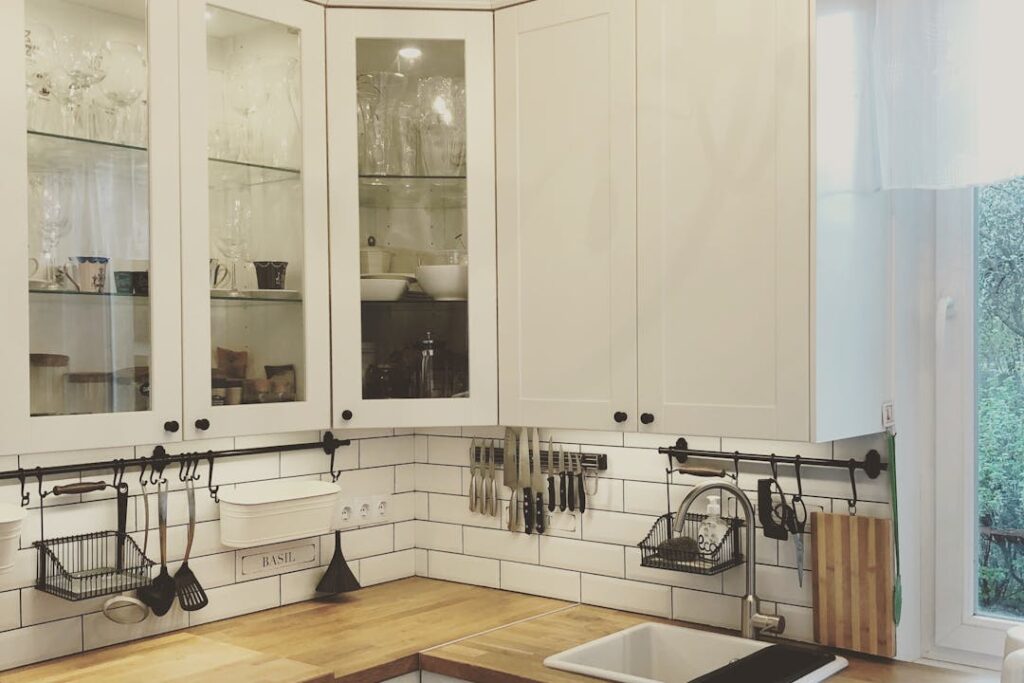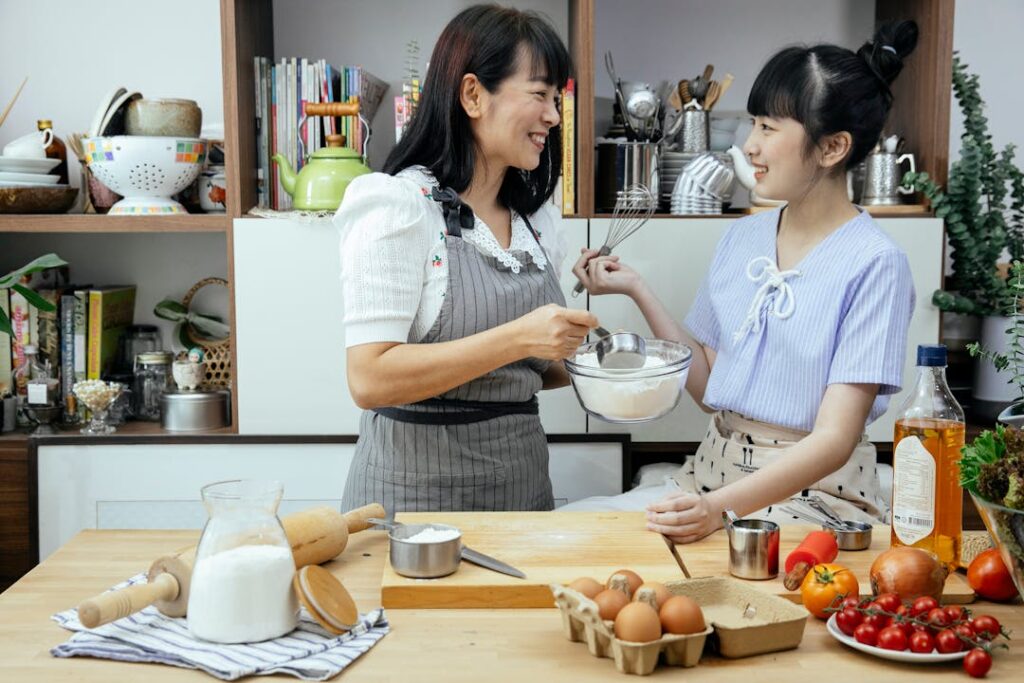You most likely are making some common kitchen mistakes that need fixing.
Once in a while, everyone is prone to making these common mistakes in the kitchen that can affect the taste and quality of our meals. Chiefly, in the hustle and bustle of daily life, our kitchens often become the center of chaos and confusion.
It’s therefore time to take a closer look at your kitchen practices with our guide to remedy the situation.
For this purpose, we’ll highlight 9 common kitchen mistakes you might be making and provide simple solutions to rectify them.
Whether overcooking pasta, using blunt knives, having a dirty kitchen, or overcrowding the pan, we’ve got you covered.
Don’t let these mistakes hinder your culinary prowess any longer. By avoiding these pitfalls and implementing our fixes, you’ll soon become a master in the kitchen.
So, let’s dive in and uncover the secrets to perfecting your culinary creations.
1. Overlooking Kitchen Organization and Storage
Your man walks into the kitchen, looking for the salt shaker. Boom, he can’t find it where it was yesterday. Why? Because you have no regular set place for it.
One of the most common mistakes in the kitchen is neglecting organization and storage.
Cluttered countertops, overcrowded cabinets, and disorganized pantries can lead to inefficiency and frustration while cooking.
To fix this, invest in storage solutions like racks, shelves, and containers to keep your kitchen tidy and organized. If you must, label your things in the kitchen for easier access.

Let me guess what may be crossing your mind…
That you are extremely busy and can’t find the time to organize your kitchen.
Simple. Look for maid services to ease this burden. They may have a package you like, e.g. cleaning and organizing your kitchen every two days, if not daily.
2. Ignoring Proper Food Storage Practices
How do you store your food?
Do you have a pantry? A refrigerator? Or even a deep freezer.
Not storing your food properly can lead to spoilage and waste. This may ultimately lead to food poisoning for your loved ones.
Ensure to store perishable items like fruits, vegetables, and dairy products in the refrigerator at the correct temperature.
In the same way, use airtight containers for leftovers to maintain freshness and prevent contamination.
This will not only ensure that you don’t waste food due to spoilage but also take care of your family’s safety.
3. Neglecting Regular Cleaning and Maintenance
Regardless of how sophisticated your kitchen looks or the rich food you have there, all will be rendered useless if your kitchen is dirty.
A clean kitchen is essential for food both safety and hygiene.
Neglecting regular cleaning can lead to grease buildup, pest infestations, and cross-contamination.
But if you develop a cleaning routine that includes wiping down surfaces, washing dishes promptly, and deep cleaning appliances regularly, you are good to go.
Do you need assistance with cleaning your home, especially your kitchen? Engage us to assist you.
4. Using Dull or Improper Kitchen Tools
In the olden times, setting out to cut a tree necessitated one to sharpen the axe first. This made the job of cutting down the tree much easier.
Similarly, you must have “sharpened tools’’ in your kitchen for the best cooking results.
When using dull knives, worn-out cookware, or inappropriate kitchen tools, you can hinder your cooking experience.
Rather, invest in
- Quality knives
- Pots
- Utensils
Look for those that are suitable for your cooking needs.
Further, keep your tools sharp and well-maintained for efficient and safe cooking.
5. Not Following Recipe Instructions Correctly
What’s your cooking routine like? Do you follow recipes while at it? Or do you just mix what is handy?
Many kitchen mishaps occur when you don’t follow recipe instructions accurately. For best cooking practices, take the time to read and understand recipes before starting cooking.
- Measure ingredients carefully and accurately
- Season the food properly
- Follow cooking times and temperatures
- Don’t skip essential steps for the best results.
6. Overcooking or Undercooking Food
Whereas observing cooking times is important as has been noted above, many people make the mistake of either overcooking or undercooking food.
This renders all the effort you put into preparing the food futile.
Take the case of overcooked rice. It becomes mushy and tasteless. When the same rice is undercooked, it’s worst because it is crunchy and inedible.
Achieving the perfect doneness of food can be challenging but crucial for a delicious meal.
Then, what is the solution to fixing this problem? Avoid overcooking or undercooking by using timers, checking doneness with a thermometer, and following recommended cooking times.
What’s more, practice makes perfect, so keep experimenting and adjusting until you get it right.
7. Neglecting Kitchen Safety Measures
The kitchen could be the source of myriad safety hazards in the home. Therefore, safety should always be a priority in the kitchen.
Many common accidents can happen like:
- Burns
- Cuts
- Falls
To that end, exercise caution when handling hot surfaces, sharp objects, and slippery floors.
Of course, keeping a first aid kit handy is important. A little first-aid knowledge to handle emergencies is equally important.
8. Improper Waste Management in the Kitchen
With all the activity in the kitchen, much waste and clutter is generated. So, how do you handle your waste?
Inefficient waste management contributes to kitchen clutter and environmental impact. But in case you use a waste disposal company, you are in luck. All you need to do is gather your waste as soon as it accumulates and seal it properly in a disposal bag.
Meanwhile, you can fix the waste clutter headache with the following tips:
- Reduce waste by meal planning so that you consume all of it
- Composting food scraps
- Recycling packaging. Use reusable containers and bags to minimize plastic waste.
In the event that you get overwhelmed, engage the services of a cleaning company.
9. Other Common Kitchen Mistakes

Although different families have different preferences, engaging your family in certain kitchen decisions is necessary.
It is common to hear concerns and questions centered around the kitchen from family. Once in a while, you may encounter questions like, what cooking oil did you use today? Why is the detergent that cleaned this cup still lingering?
In a word, avoid things like:
- Using the wrong cooking oil
- Not preheating the oven. Preheating ensures you cook food to the right temperature
- Overcrowding the pan. If overcrowded, food does not cook and brown properly
When you avoid such mistakes, your kitchen department runs smoothly.
Conclusion: Tips for Avoiding Common Kitchen Mistakes
By being mindful of organization, storage, food safety, tools, recipe accuracy, cooking techniques, safety measures, and waste management, you can avoid common kitchen mistakes and enjoy a smoother cooking experience.
Remember to prioritize cleanliness, organization, and safety in your kitchen for delicious and enjoyable meals.
Are there more kitchen mistakes you’d like to share? Join the comments section.
FAQs: Answering Common Questions About Kitchen Mistakes
- How can I organize my kitchen effectively?
- First, declutter your kitchen; make it more organized by getting rid of everything you don’t use.
- Use storage solutions like racks, shelves, and containers to maximize space.
- Group similar items together for easy access and visibility.
- Label containers and shelves to stay organized.
- Regularly review and update your organization’s system as needed.
- What are some essential kitchen safety tips?
- Always wash your hands before handling food.
- Use separate cutting boards for raw meats and produce to avoid cross-contamination.
- Keep pot handles turned inward on the stove to prevent spills.
- When handling hot plates and pans, wear oven mitts or potholders.
- Store combustibles far from heat sources such as stoves.
- How do I know if food is cooked properly?
- Use a food thermometer to check the internal temperature of meats and poultry.
- Observe the suggested cooking temperatures and times for each type of food.
- Look for visual cues like golden-brown color and crispiness in baked goods and fried foods.
- Practice with recipes and pay attention to texture and doneness indicators.
- What are the best tools for a well-equipped kitchen?
- Quality knives for chopping, slicing, and dicing.
- Non-stick cookware for easy cooking and cleaning.
- Measuring cups and spoons for accurate ingredient measurements.
- Mixing bowls in various sizes for meal preparation.
- Kitchen gadgets like a blender, food processor, and stand mixer for versatile cooking tasks.
- How can I reduce food waste in my kitchen?
- Plan meals and create a shopping list to buy only what you need.
- Store leftovers properly in airtight containers for future meals.
- Use up ingredients before they expire by incorporating them into meals.
- Compost food scraps like fruit peels, vegetable trimmings, and coffee grounds.
- Be mindful of portion sizes to avoid cooking too much and wasting food.
[…] start with the kitchen, for instance. If you have kitchen cabinets, the easier the task will be. Put things you normally […]